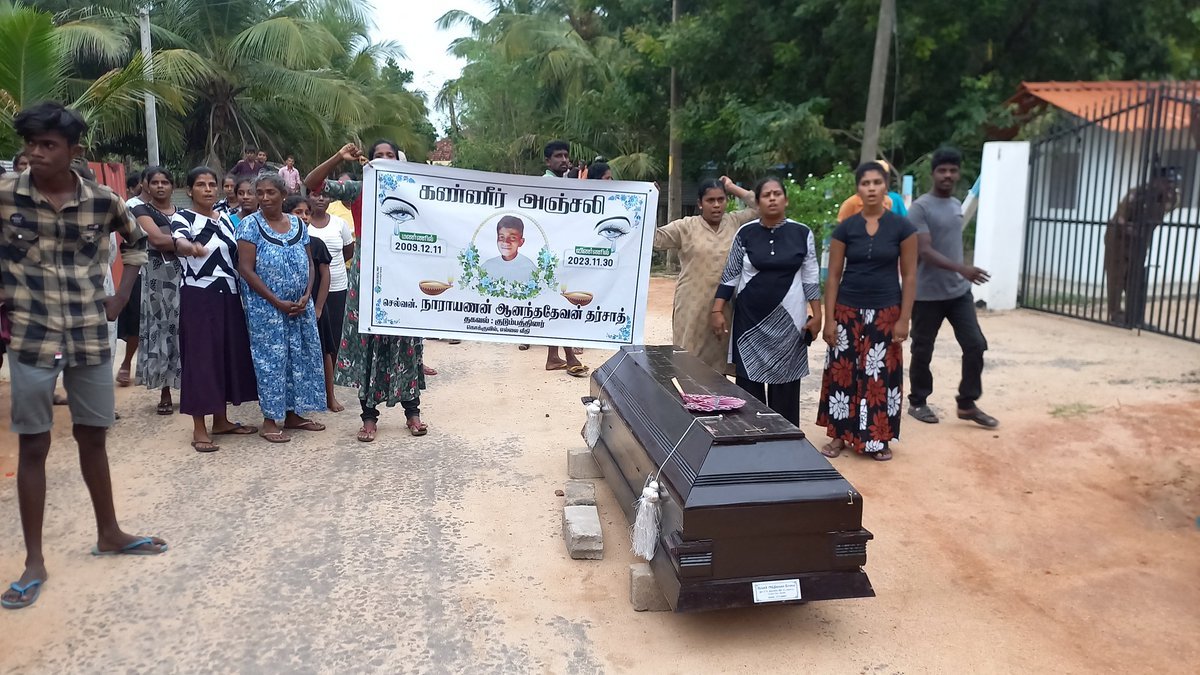On December 4, scores of Tamils staged a demonstration in Kokuvil over the killing of 13-year-old Anandadeepan Darsanth. The boy was reportedly beaten to death and pronounced dead on November 29 after Sri Lankan police picked him on the allegation of stealing on November 16.
During his funeral rites, outraged locals took to the streets while carrying his coffin to the nearby police station. The protesters, mostly Tamils, demanded justice against police brutality. Accusing the authorities of vindictive court orders and arrests of activists, the Tamil population has for long been on the receiving end, the protesters said.
1/Custodial deaths in #SriLanka continue due to impunity but where children who come into conflict with the law are concerned, there are several other issues which are ignored. Institutionalizing children should be last resort but in SL seems to be default/first response. https://t.co/7stW0MiSqj
— Ambika Satkunanathan (@ambikasat) December 4, 2023
“A (…) boy was beaten to death using a broom and a wicket by the Matron of the children’s detention center he was entrusted to. This child was in the care of an institution which was supposed to protect him,” state minister of defense, Premitha Bandara Tennakoon told Parliament on December 3.
The court had, however, instructed the police to send the minor to the Kalmunai Reformatory School. The findings of the post-mortem report said the minor had multiple injuries on his body.
“The fact that it was the Matron of the institution where this child was handed over for protection, which had beaten the child to death, is a national tragedy,” Premitha said.
“As a father, I am deeply shocked and ashamed that this has happened in Sri Lanka. There should be no room for such things. I believe that the relevant Ministry and the Government must act, and ensure such incidents do not happen again.”
Pattern of abuse
According to the grassroots media outlet Groundviews, the custodial killing of 13-year-old Anandadeepan Darsanth, cannot be seen as an isolated incident and it was the third of such killings of detained Tamil people this year. They wrote, “The deaths are symptomatic of a pervasive and systemic issue that urgently requires a holistic reevaluation of law enforcement practices.”
On November 19, Nagarasa Alex, a 26-year-old Tamil man, was brought dead to the Jaffna Teaching Hospital from prison. The post-mortem later revealed that injuries, abrasions and contusions in different parts of his body, suggesting that the death was due to unnatural reasons.
He was initially arrested by police on the charges of burglary. He was remanded by order of the Jaffna Mallakam Magistrate Court.
Alex’s statement in a video of him shared on social media testifies the level of torture he was subjected to in police custody: “Police arrested me on suspicion and beat me severely. My hands were tied behind and my face was covered and beat me repeatedly pouring water repeatedly. I was hanged upside down and beaten. Then they covered my face with a petrol choked plastic bag and beat me. I fell unconscious.”
“Now I can’t lift both my hands. I was not given food on the first day. Next day they took me to their room and said not to file any case with the Human Rights Commision of Sri Lanka (HRCSL). Then they gave me one packet of arrack to drink,” Alex testified reportedly hours before he was declared dead.
In another similar incident, a 42-year-old domestic worker was declared dead mysteriously in police custody on May 12. R Rajkumari was arrested after she was accused of stealing a ring while working as her maid. Interestingly, in the police records, no report was found regarding her arrest and interrogation.
A Judicial Medical Officer’s finding in the post-mortem report said the cause of death was hemorrhagic shock which could only take place after sustaining blunt force trauma caused by a blunt weapon or similar object.
Four policemen including a sub-inspector from the Welikada police station were arrested and remanded by the Colombo Chief Magistrate’s Court. Rights body Ground Views argued in its report that lack of proactive steps from the government not only impedes justice but also fosters an environment of impunity
“The fact that these deaths (R. Rajakumari, Samantha Preethi Kumara and Nagaraza Alex) have been officially identified as crimes by the respective courts, with orders issued for the arrest of the police officers who involved in these criminal activities, is a serious testament to the gravity of the situation,” said the rights body.





